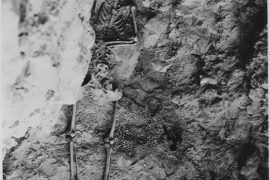I am continuing to post the materials that I have used in my courses for 45 years now–free for anyone to see and use. You are welcome to print out, read, and share the link via social media, but please do not repost or reproduce without permission.
Temples & Holy Places
In antiquity, Temples are not gathering places for worshipers but “houses” for the gods or for the statue as representative of the god. They represent the sacred places where one can contact the divine. There one might come for prayers, offerings, and sacrifices, or to receive an oracle, a favor, or a miracle from the deity. There are temples of all sorts, public (civic) and private (specific cult).
The following are some sample texts which illustrate aspects of Temple worship and piety.
Rules of Purity for Visitors to a Temple
Whoever wishes to visit the temple of the goddess [Athene Nikephorus], whether a resident of the city or anyone else, must refrain from intercourse with his wife (or husband) that day, from intercourse with another than his wife (or husband) for the preceding two days, and must complete the required lustrations. The same prohibition applies to contact with the dead and with the delivery of a woman in childbirth. But if he has come from the funeral rites or from the burial, he shall purify [sprinkle] himself and enter by the door where the holy water stoups are, and he shall be clean that same day.
Temple of Athena at Pergamon, Dittenberger, Sylloge (2nd), 566, 2-9. Very old law, probably still in force in Hellenistic period.
It is not permitted to enter the temple of the Lady Goddess with any object of gold on one’s person, unless it is intended for an offering; or to wear purple or bright colored or black garments, or shoes, or a finger ring. But if one enters wearing any forbidden object, it must be dedicated to the temple. Women are not to have their hair bound up, and men must enter with bared heads. No flowers are to be brought in at the mysteries; no pregnant women or nursing mothers are to have any part. If anyone wishes to make an offering, let it be of olive, myrtle, honey, grains of barley clean from weeds, a picture, a white poppy, lamps incense, myrrh, spice. But if anyone wishes to offer the Lady Goddess sacrificial animals, they must be female and white . . .
Common type of inscription, this one from Lycosura. Very old, but common into Roman imperial times. Dittenberger, Sylloge, 939.
Regulations for Visitors to the Temple of Alectrona at Lalysus
Law [concerning] what is not holy to let enter or to bring into the temple and the sacred enclosure of Alectrona. No horse, ass, mule, jenny, or any other mane-growing animal may enter, and no one may bring one in hither; nor may anyone enter wearing shoes or anything made of pigskin. Whoever disregards this law, let him cleanse the sanctuary and the sacred enclosure, and in addition offer sacrifice; or let him be guilty of irreligion [i.e., subject to the curse that haunts those who disregard, dishonor, or disobey the gods]. If sheep wander in, whoever drove them in shall pay a fine of an obol for each sheep. Whoever wills may report any infringements of these rules to the Mastroi [i.e., temple officials].
Marble tablet from 3rd c. B.C.E. Dittenberger, Sylloge, 560

Epiphany of the goddess Athena
When Darius, King of Persia, sent forth a great army for the purpose of enslaving Hellas, this island was the first which his fleet visited [Rhodes]. The people in the country were terrified at the approach of the Persians and fled for safety to all the strongholds, most of them gathering at Lindus. Thereupon the barbarians set about to besiege them, until the Lindians, sorepressed by a water shortage, were minded to hand over the city to the enemy. Right at this juncture the goddess stood over one of the magistrates in his sleep and bade him to be of good courage, since she herself would procure by intercession with her father, the water they needed. The one who saw the vision rehearsed to the citizens Athena’s command. So they investigated and found that they had only enough water to last for five days, and accordingly they asked the barbarians for a truce in just that number of days, saying that Athena had sent to her father for help, and if help did not come in the specified time they would surrender the city . . . . When Datis, the admiral of Darius, heard this request he immediately burst out laughing. But the next day, when a great cloud gathered about the Acropolis and a heavy shower fell inside the cloud, so that contrary to all expectations the besieged had plenty of water, while the Persian army suffered for lack of it, the barbarian was struck by the epiphany of the goddess. He took off his personal adornment and sent it as an offering–his mantle, his necklace, his bracelets, and . . . . and even his chariot, which formerly was preserved, but was burned along with most of the offerings when the priest of Helios was Eucles, son of Astyanactidas, when the temple caught fire [350 B.C.E.?]. As for Datis, he set forth on the business before him, after establishing peace with the besieged and declaring publicly, “These men are protected by the gods.” These events are described by Eudemus in his Lindiaca, by Ergias in the fourth of his histories, by Polyzelus in the fourth of his histories . . . . [long list of authorities follows].
While the priest of Helios was Pythanna, son of Archipolis in Lindus, a man got himself shut into the temple secretly at night and hanged himself on the struts between the back of the image and the wall. When the Lindians were planning to send to Delphi and inquire what they ought to do in the circumstances, the goddess stood over the priest in his sleep and bade them rest easy so far as she was concerned; however, they should uncover part of the roof immediately above the image, and leave it so till three suns had gone by and the place had been cleansed by water falling from her father; then they were to join up the roof again as it was before and, having cleansed the temple in the regular way, offer sacrifice according to the traditional rites to Zeus . . . [follows a list of authorities for this tale].
This inscription runs many more lines. It dates from 96 B.C.E. and was placed at the temple of Athena at Lindus in Rhodes. It tells of the various appearances of the goddess in testimony fashion. Lietzmann, Kleine Texte, no. 131.
Rules of Purity for Priestess of Demeter (at Cos)
The priestess must be pure from the following: She must in no way come in contact with anything filthy [ceremonially unclean?]; she must not participate in a hero meal [i.e., a meal for the dead]; she must not touch a grave; she must not enter a house where a woman has given birth to a child, whether a live birth or a still one, during the preceding three days; nor during the three days following a burial shall she enter the house in which someone has died; and she must not eat carrion [i.e., meat of any animals that have perished or been suffocated].

Oracle at Dodona
Heracleidas asks Zeus and Dione good Fortune, and inquires of the god concerning a child, if he is to have one by Aigle, his present wife.
Nicocrateia asks to which of the gods she had better or more advantageously offer sacrifice and have the illness cease.
Whether we ought to go around in Elina . . .or in Anactorium . . . or sell the . . .
Lysanias asks Zeus Naios and Deona if the child which Annyla is bearing is his.
Procedure at an Oracle
. . . When those named above are present at the oracle and the sacrifice has been offered in accordance with ancestral custom, and with favorable result, the secretary of the god shall, after the offering of the sacrifice, take up the list of those who wish to inquire of the oracle, write all their names, on a white tablet, set this at once before the temple, and then admit them, calling them in the order of their names on the list, except when one or another has permission to enter first. If the person called is not present, the secretary shall admit the next following, until the one who was called arrives. In the sanctuary the persons named on the list shall be seated properly clad in festival garments, crowned with laurel crowns, ceremonially clean and sober; and they shall receive the question tablets from those inquiring. When the oracle begins, they are to toss the tablet into a vessel and seal it with the seal of the commanders and law guardians, and also with that of the priest, and shall permit [the inquirers or the tablets?] to remain in the vessel, display the seals to the above named, open it, and calling off the names in the order of the list, return to each his question tablet with the oracle reply. . . .
c. 100 B.C.E. inscription. Dittenberger, Sylloge, 790.

Healings of Asclepius
Cleo was pregnant for five years. When she had now been pregnant for five years, she turned for help to the god and slept in the holy of holies. As soon as she came out again and had left the sacred precincts she bore a son, who as soon as he was born, washed himself at the spring and walked around with his mother.
A man whose fingers, all but one, were paralyzed. He came to the god looking for help, but when he read the tablets set up in the temple he gave no credence to the healings and made fun of the inscriptions. But as he slept he had the following dream. It seemed to him that he was playing dice in the temple and was about to make a throw. The god appeared to him, and sprang upon his hand and stretched out his fingers. Then he got up and, still in his dream, the man clenched his fist and opened it, stretching out one finger after another. After he had stretched them all out, the god asked him if he still refused to believe what the inscriptions related, and he said “no.” “Well then” answered the god, “since you formerly refused to believe what is not unbelievable, you shall henceforth be known as the “Doubter.” When it was day, he came out cured.
Ambrosia from Athens was blind in one eye. She came to the god seeking help, but as she went about the temple she mocked at the many records of curse: “It is unbelievable and impossible that the lame and the blind can be made whole by merely dreaming!” But in her sleep she had a dream. It seemed to her that the god came up and promised to make her whole; only in return she must present a gift offering in the temple–a silver pig, in memory of her stupidity. After saying this he cut open her defective eye and poured in some drug. And when it was day she went forth cured.
Dittenberger, Sylloge, 802-803. People who received cures would put up plaques to testify of their miracle in the temples of Asclepius, the most famous healing deity. We also have many stories of healings by holy men.

Rules of a Private Religious Association
Good fortune! They were written for the health and common welfare and the noblest thought, the commandments given to Dionysius [by Zeus], granting access in sleep to his own house both to free men and women, and to household slaves. For here are the altars of Zeus Eumenes, Hestia who is seated be side him, and the other Savior Gods: Eudaimonia, Plutus, Arete, Hygiaea, Tyche Agathe, Agathos Daimon, Mnene, Charites, Nike.
To him Zeus gave commandments: To observe the purification and cleansing rites, and offer the sacrifices in accordance with ancestral rites and as now practiced. Those who enter this house [i.e., temple], both men and women, both bound and free, are to take oath before all the gods that, conscious of no guile toward man or woman, they will not administer an evil drug to men, nor will they learn or practice wicked charms, nor give any philter, or any abortive or contraceptive drug, nor commit robbery or murder, either carrying it out themselves or advising another or acting as witness, nor overlook complacently those who rob [or withhold offerings] in this house; and if anyone shall do any of these things or advise them, they will not consent or pass over it in silence, but will bring it out into the open and see that the crime is punished.
A man is not to take another woman in addition to his own wife, either a free woman or a slave who has a husband, nor is he to corrupt either a child [boy] or virgin, nor is he to counsel another to do so; but if he should witness anyone doing such, he must not hide it or keep silent. Woman and man, whoever does any of the things above written, let them not enter this house. For the gods who dwell here are mighty and watch over these things and will not hold back punishment from those who transgress their commandments. A free woman is to be pure and is not to know bed or intercourse with any man other than her own husband. If she does she shall not be pure, but is defiled and full of corruption within her family and is unworthy to worship this god for whom these rites were established, or to offer sacrifices, or to . . . [about 12 lines missing] to stumble upon or to see the mysteries observed above. If anyone does any of these things with which the commandments here copied have to do, terrible curses from the gods will come upon those who disregard them. For God does not by any means will that these things should come to pass, nor does he desire it, but to obey [i.e., God wants obedience, not to punish].
To those who obey the gods will be gracious and will always be giving them everything good, such as the gods desire to give men they love. But if any transgress, they will hate such persons and lay upon them great penalties.
These commandments were placed here by Agdistus, the most holy Guardian and Mistress of this house, that she might show her good will to men and women, bond and free, so that they might follow the rules written here and take part in the sacrifices which are offered month by month, year by year, even those, both men and women, who believe within themselves this writing in which the commandments of God are written. . . .
Marble stele, dating from 1st c. B.C.E., Philadelphia. Dittenberger, Sylloge, 985.









Comments are closed.